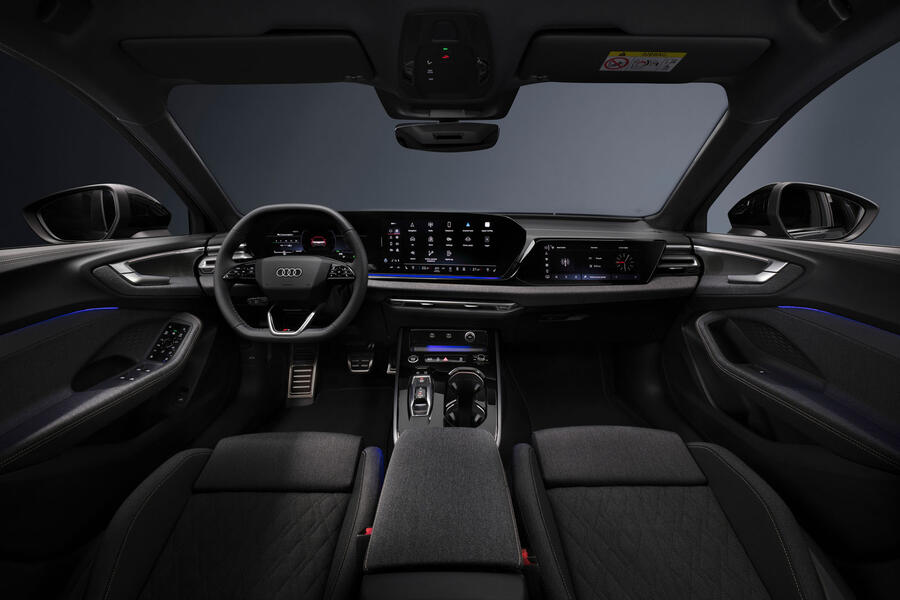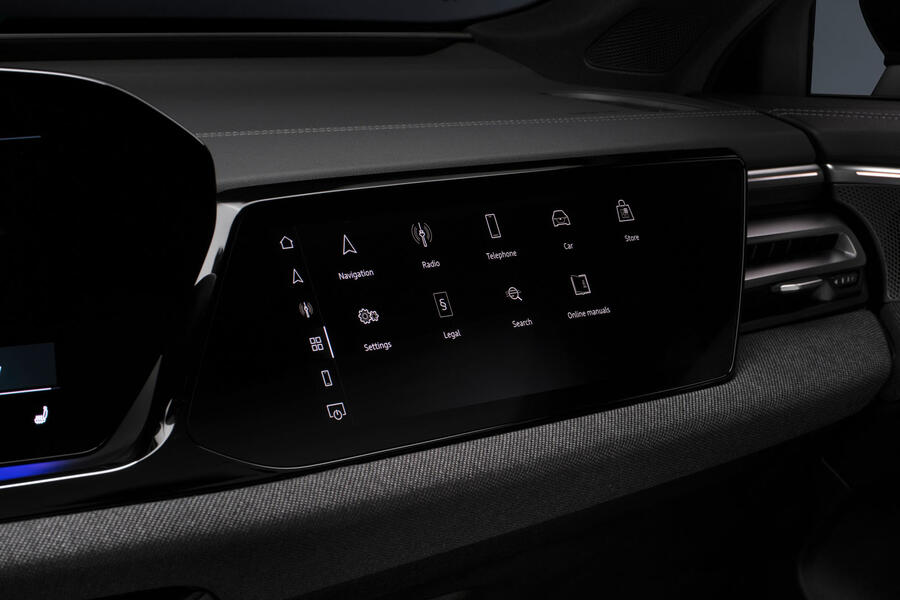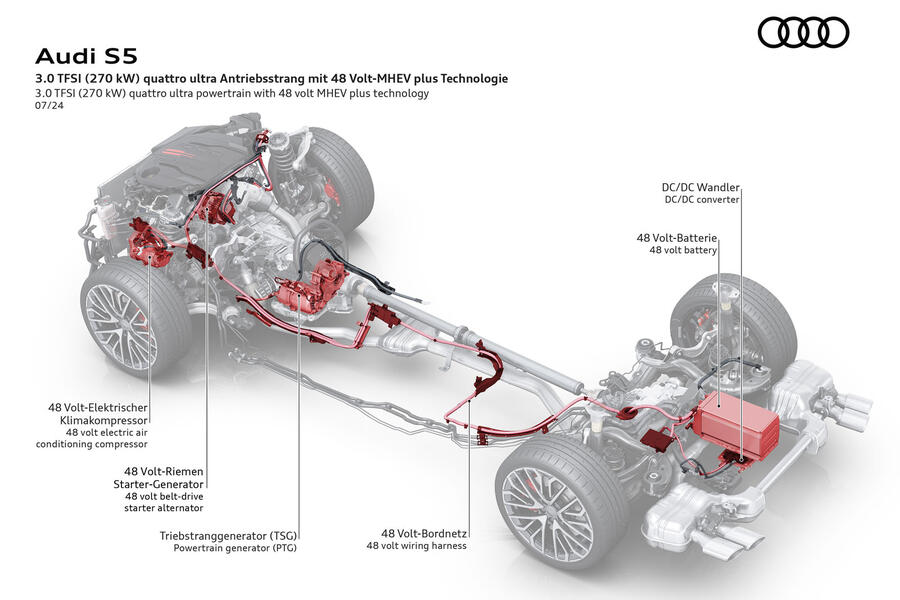Audi’s new mild-hybrid system puts out 24bhp and 170lb ft of torque
New saloon and estate model range includes petrol, diesel and PHEV options; tops out with £70k S5 Avant
The new Audi A5 is now on sale in the UK from £41,950, with the option of a saloon or estate bodystyle and a choice between petrol, diesel and plug-in hybrid power.
The replacement for the A4 – which is set to be relaunched as an EV next year – is available to order in standard and warmed-up S5 guise from today (13 August) ahead of customer deliveries beginning in November.
That means its predecessor is now off sale in the UK until its EV replacement arrives – the first time in three decades that Audi hasn’t offered a model badged A4.
The previous-generation A5, a large coupé available with two or four doors, has also been retired.
The new A5 range opens with Sport trim, with standard equipment including 18in alloy wheels, Comfort suspension, LED lights and dynamic indicators at each end, a wireless phone charger, ambient lighting and a 360deg parking camera.
S Line trim ramps the entry price up to £44,100, and adds larger 19in wheels, Sports suspension, privacy glass, a more advanced multifunction steering wheel, aluminium interior trim and various bespoke sporty styling cues.
Limited-run Edition 1 trim, priced from £49,100, is marked out by its 20in two-tone wheels, red brake callipers, contrasting black trim, matrix LED headlights, dark chrome exhaust tips, microfibre upholstery and front passenger touchscreen – features that are all available as options elsewhere in the A5 range.
The warmed-up S5 range-topper, which uses a 3.0-litre petrol V6, is available exclusively in Edition 1 guise for now, priced from £68,700.
Those prices are all for the A5 saloon; the A5 Avant estate adds around £1900 to the list price across the line-up.
New Audi A5: engines, performance and specs
The A4 being renamed the A5 is part of the German firm’s new branding strategy for its next-generation models, with ICE cars taking odd numbers and EVs even numbers.
It uses Audi’s new Premium Platform Combustion (PPC), which replaces the 17-year-old MLB architecture of the current A4 and has no relation to the Premium Platform Electric that will underpin the brand’s new-wave EVs, including the Q6 E-tron.
In keeping with Audi tradition, the A5 retains a longitudinal engine layout, but it’s said to be much more accommodating of various electrified powertrains.
The A5 will initially offer a range of pure-ICE and mild-hybrid powertrains, the latter using a new MHEV Plus system developed by Audi that utilises two motor-generators for better efficiencies and regenerative braking (see below).
The range opens with two developments of the Volkswagen Group’s ubiquitous EA888 turbo petrol four, putting out either 148bhp or 201bhp. Both are mated to a dual-clutch automatic gearbox, plus Quattro four-wheel drive is an option on the more powerful variant.
![]()
Diesel remains an option, with the A5 using a modified version of Volkswagen’s 2.0-litre turbo four, fitted with the MHEV Plus system, boosting its output to 201bhp and cutting CO2 emissions by a claimed 10g/km.
The range-topping S5 has switched back to petrol power, packing a 3.0-litre V6 that’s said to be unrelated to that currently offered in the A8, Q7 and Q8. It gets a variable-geometry turbocharger and the MHEV Plus system, putting out 362bhp – 20bhp more than the old S4’s diesel V6 – and a claimed 14g/km less CO2.
A plug-in hybrid powertrain with an electric-only range of 62 miles will follow next year.
Autocar understands the PPC can also support range-extender EV powertrains, but Audi doesn’t have plans to offer one in the A5.
The new platform also means the saloon has grown significantly, becoming 67mm longer (at 4.83m) and 13mm wider (at 1.86m). Its wheelbase is 68mm longer too (at 2.9m), Audi having prioritised interior space.

Visually, the A5 is clearly an evolution of the A4, with a smooth-edged design that borrows cues from the A6 E-tron saloon EV concept shown three years ago. Key to the look are flared wheel arches that the designers refer to as ‘Quattro muscle’.
The new optional OLED front and rear lights can display eight patterns apiece and have a Dynamic mode that continually changes what’s displayed.
The A4’s false exhaust tips have been ditched in response to customer feedback.
Inspired by the Q6 E-tron, the interior has a large curved display serving as the focal point on the dashboard. It’s split into an 11.9in digital instrument panel and a 14.5in infotainment touchscreen.
The latter hosts the climate controls and functions such as seat heating and ventilation.

An extra 10.9in touchscreen can be added for the front passenger’s entertainment, with a filter that obscures it from the driver’s vision while the car is moving.
Audi’s not-so-mild hybrid system

Audi’s new MHEV Plus system is unlike most other mild-hybrid offerings in that it has two generators, adding a centrally mounted powertrain generator (PTG) to the usual integrated starter-generator (ISG).
The main advantage is a drastic improvement in the power of the regenerative braking system. It can now recuperate up to 25kW – more than three times the 8kW limit of the old S4 – and put out 18kW (24bhp) and 170lb ft of torque.
Torque fill is provided at low engine revs as the turbochargers spool up.
The improved energy recovery also means the system can charge its battery much quicker.
It also reduces use of the friction (disc) brakes. In fact, Audi claims the regeneration provides sufficient deceleration for most scenarios.
The system was designed to discharge and recharge the battery rapidly.
One engineer suggested the intention is to shut the engine off as much as possible. They said the car can manoeuvre at low speeds and ‘surf’ at A-road speeds (up to about 50mph) using only electric power.
The car’s electrical and air-conditioning systems are driven by the mild hybrid system as well.
Source: Autocar